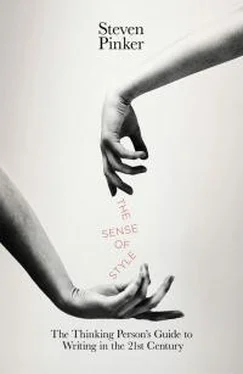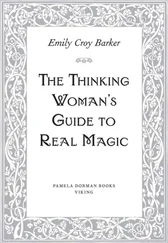So singular they has history and logic behind it. Experiments that measure readers’ comprehension times to the thousandth of a second have shown that singular they causes little or no delay, but generic he slows them down a lot. 56\Even T-Rex, in a subsequent Dinosaur Comics strip, conceded that his purism was mistaken:

Assuming you aren’t willing to start a campaign for thon, does that mean you should go ahead and use singular they ? It depends on the level of formality, the nature of the antecedent, and the available alternatives. Obviously singular they is less acceptable in formal than in informal writing. It is also more conspicuous when the antecedent is an indefinite noun phrase like a man, whose singular aroma makes the apparent plurality of they stand out. It’s not as problematic with a universally quantified antecedent like everyone, and barely noticeable with a negative quantifier like no or any .
The judgments of the Usage Panel are sensitive to this difference. Only a minority accepts A person at that level should not have to keep track of the hours they put in —though the size of that minority has doubled in the past decade, from 20 percent to almost 40 percent, one of many signs that we are in the midst of a historical change that’s returning singular they to the acceptability it enjoyed before a purist crackdown in the nineteenth century. A slim majority of the panel accepts If anyone calls, tell them I can’t come to the phone and Everyone returned to their seats. The main danger in using these forms is that a more-grammatical-than-thou reader may falsely accuse you of making an error. If they do, tell them that Jane Austen and I think it’s fine.
For many decades usage manuals have recommended two escape hatches for the singular pronoun trap. The easiest is to express the quantified description as a plural, which makes they a grammatically honest pronoun. If you think that you can improve on Jane Austen’s prose, for example, you could change Every body began to have their vexation to They all began to have their vexations. This is the solution that experienced writers use most often, and you would be surprised how many generic or universal sentences can be recast with plural subjects without anyone noticing: Every writer should shorten their sentences is easily transformed into All writers should shorten their sentences or just Writers should shorten their sentences.
The other escape hatch is to replace the pronoun with an indefinite or generic alternative and count on the reader’s common sense to fill in the referent: Every body began to have their vexation becomes Every body began to have a vexation, and Every dinosaur should look in his or her mirror becomes Every dinosaur should look in the mirror .
Neither solution is perfect. Sometimes a writer really does need to focus on a single individual, which makes a plural inappropriate. In Americans must never live under a cloud of suspicion just because of what they look like, the generic plural Americans can be interpreted to mean “the typical American” or “most Americans,” which undermines Obama’s declaration that freedom from discrimination must apply to each and every one without exception. With Shaw’s dialogue, plural subjects in Men never go to battle to be killed. But many of them do get killed would have undercut the point of the exchange, in which the listener is asked to ponder the foolhardiness of an individual enlistee, and the replacements would also have sabotaged Shaw’s juxtaposition of the low probability that any given individual will be killed with the high probability that some of them will be killed. Nor can a pronoun always be replaced by an indefinite or generic noun:
During an emergency, every parent must pick up their child.
During an emergency, every parent must pick up a child.
The replacement makes it seem as if a parent could choose a child at random to pick up, rather than being responsible for picking up his or her own child.
Because of these complexities, writers always have to consider the full inventory of devices that the English language makes available to convey generic information, each imperfect for a different reason: he, she, he or she, they, a plural antecedent, replacing the pronoun, and who knows, perhaps someday even using thon .
For some purists, these complexities provide an excuse to dismiss all concerns with gender inclusiveness and stick with the flawed option of he . Gelernter complains, “Why should I worry about feminist ideology while I write? … Writing is a tricky business that requires one’s whole concentration.” But the reaction is disingenuous. Every sentence requires a writer to grapple with tradeoffs between clarity, concision, tone, cadence, accuracy, and other values. Why should the value of not excluding women be the only one whose weight is set to zero?
DICTION
Even writers who are skeptical of traditional prescriptions on grammar tend to give more weight to prescriptions on word choice. Fewer superstitions have grown up around word meaning than around grammar, because lexicographers are pack rats who accumulate vast collections of examples and compose their definitions empirically rather than kibitzing in an armchair with half-baked theories about how English ought to work. As a result, the definitions in contemporary dictionaries are usually faithful to the consensus of literate readers. A writer who is unsure of the consensus for a word is well advised to look it up rather than embarrass himself and annoy his readers with a malaprop. (The word malaprop, short for malapropism, comes from Mrs. Malaprop, a character in Richard Sheridan’s 1775 play The Rivals, who misused words to comic effect, such as reprehend for apprehend and epitaph for epithet. )
Though less nonsense is disseminated about word meanings than about grammar, the nonsense factor is far from zero. With the backing of data from the AHD Usage Panel, historical analyses from several dictionaries, and a pinch of my own judgment, I will review a few fussbudget decrees you can safely ignore before turning to living distinctions you’d be wise to respect.
Word
Only Sense Allowed by Purists
Sense Commonly Used
Comment
aggravate
make worse (
aggravate the crisis
)
annoy (
aggravate the teacher
)
The “annoy” sense has been in use since the 17th century and is accepted by 83% of the Usage Panel.
anticipate
deal with in advance (
We anticipated the shortage by stocking up on toilet paper.
)
expect (
We anticipated a pleasant sabbatical year.
)
The “expect” sense is accepted by 87% of the Usage Panel.
anxious
worried (
Flying makes me anxious.
)
eager (
I’m anxious to leave.
)
The Usage Panel splits 50-50, but the “eager” sense has long been in use and is included without comment in most dictionaries.
comprise
contain (
The US comprises 50 states.
)
compose, make up (
The US is comprised of 50 states.
)
The “compose” sense is often used and increasingly accepted, particularly in the passive.
Читать дальше













